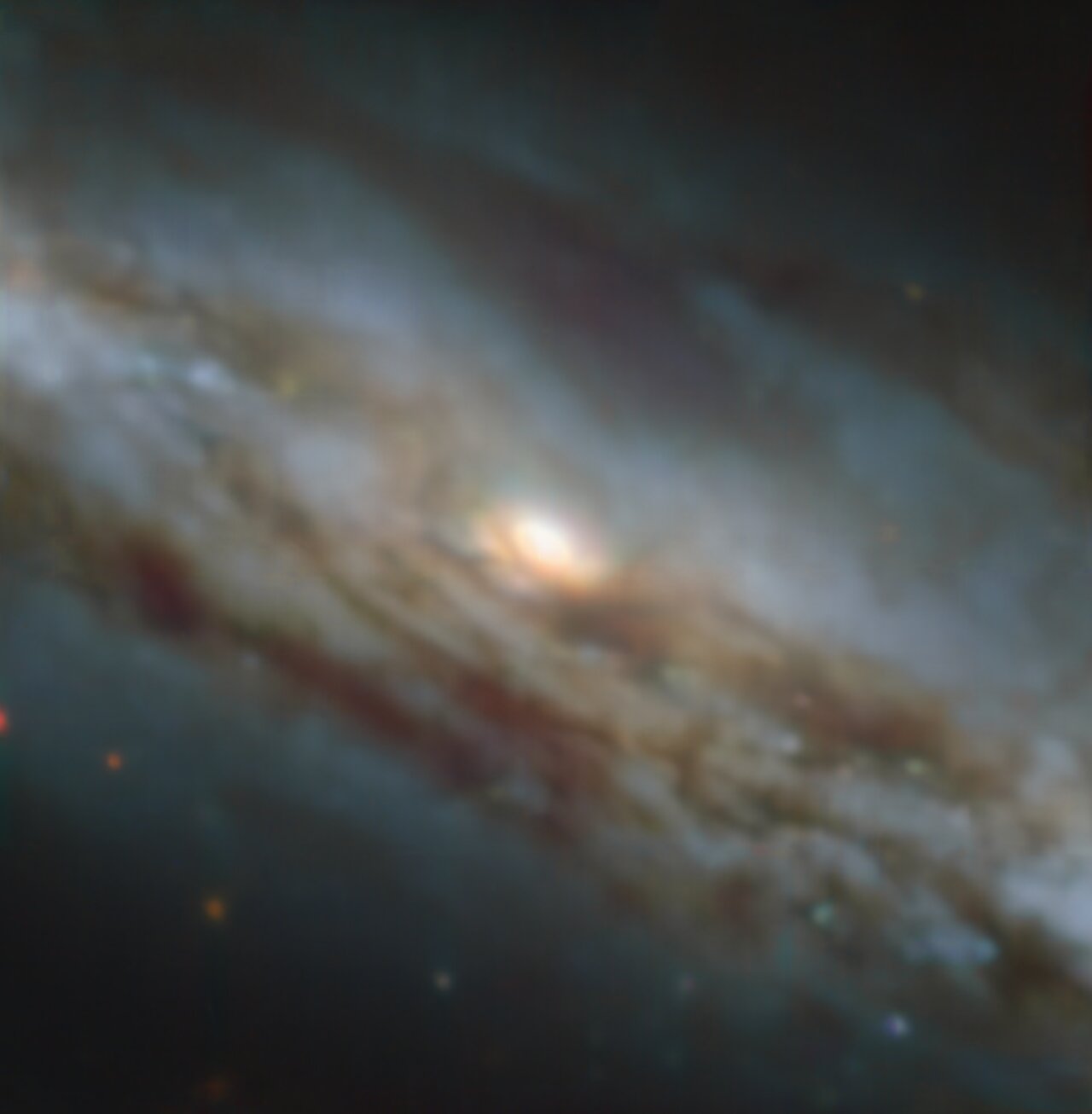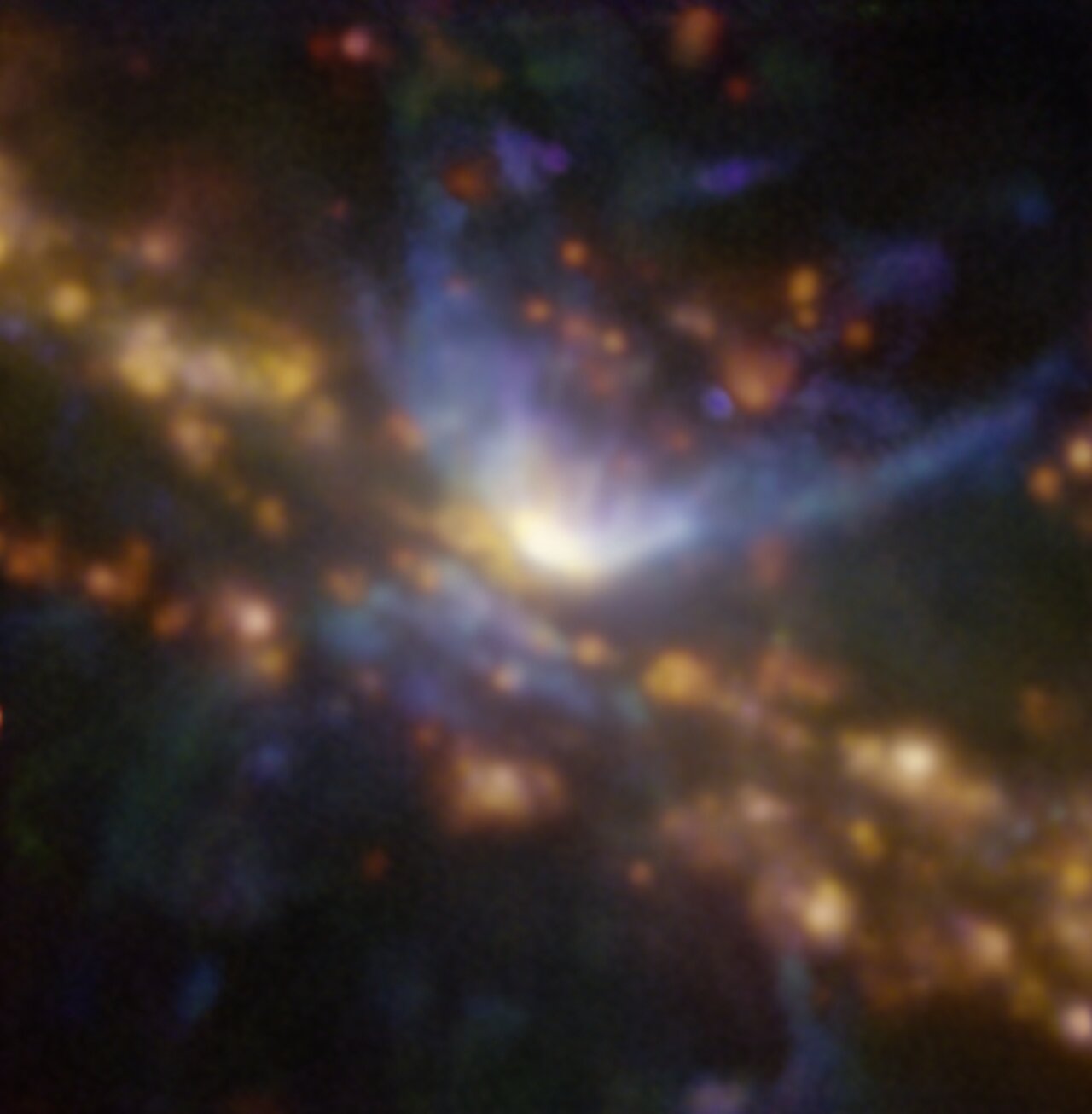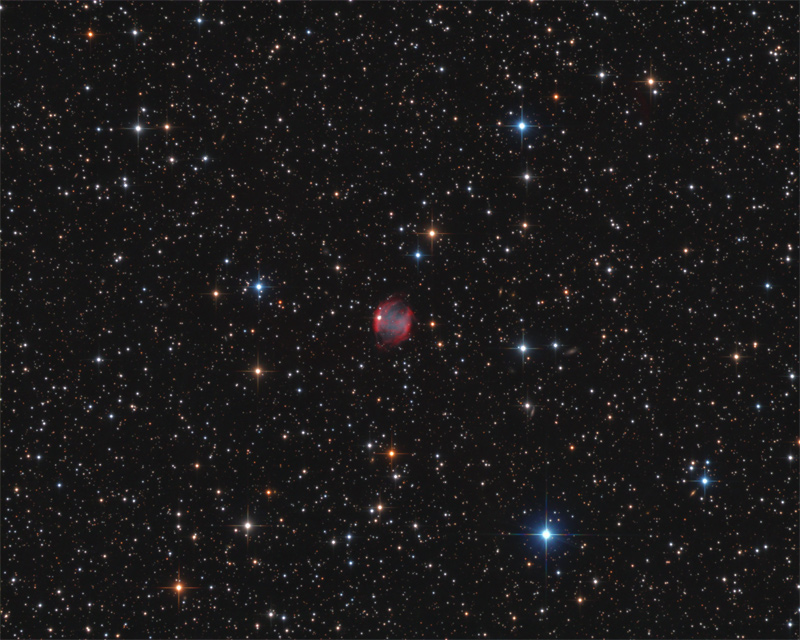Found Images: 2022 February
Found Images: 2022 February
Have you seen a great image or video somewhere that you think would make a great APOD? Nominate it for APOD! Please post as much information here as you have about the image/video with a link to any source(s) for it you know of here, and the editors will take a look.
When posting the image itself, please do not post anything larger than a thumbnail here; please honor the copyright holder's copyright.
Please keep hotlinked images under 500K.
Thank you!
<< Previously
Know the quiet place within your heart and touch the rainbow of possibility; be
alive to the gentle breeze of communication, and please stop being such a jerk. — Garrison Keillor
alive to the gentle breeze of communication, and please stop being such a jerk. — Garrison Keillor
-
starsurfer
- Stellar Cartographer
- Posts: 5409
- Joined: Thu Mar 15, 2012 7:25 pm
Re: Found Images: 2022 February
Pre 71
https://www.imagingdeepspace.com/pre-71.html
Data: Peter Goodhew
Processing: Marcel Drechsler
https://www.imagingdeepspace.com/pre-71.html
Data: Peter Goodhew
Processing: Marcel Drechsler
-
starsurfer
- Stellar Cartographer
- Posts: 5409
- Joined: Thu Mar 15, 2012 7:25 pm
-
starsurfer
- Stellar Cartographer
- Posts: 5409
- Joined: Thu Mar 15, 2012 7:25 pm
-
starsurfer
- Stellar Cartographer
- Posts: 5409
- Joined: Thu Mar 15, 2012 7:25 pm
-
starsurfer
- Stellar Cartographer
- Posts: 5409
- Joined: Thu Mar 15, 2012 7:25 pm
Re: Found Images: 2022 February
-
starsurfer
- Stellar Cartographer
- Posts: 5409
- Joined: Thu Mar 15, 2012 7:25 pm
Re: Found Images: 2022 February
Longmore 16
https://www.chart32.de/index.php/component/k2/item/387
Copyright: CHART32
Processing: Johannes Schedler
https://www.chart32.de/index.php/component/k2/item/387
Copyright: CHART32
Processing: Johannes Schedler
Re: Found Images: 2022 February
NGC 5101
https://www.chart32.de/index.php/component/k2/item/376
Copyright: CHART32
Processing: Bernd Flach-Wilken
https://www.chart32.de/index.php/component/k2/item/376
Copyright: CHART32
Processing: Bernd Flach-Wilken
Color Commentator
NOIRLab: A Galactic Vortex (NGC 1672)
A Galactic Vortex
NOIRLab Image of the Week | 2022 Feb 02
NOIRLab Image of the Week | 2022 Feb 02
The arms of the barred spiral galaxy NGC 1672 sweep across this Image of the Week, captured by the Víctor M. Blanco 4-meter Telescope (Blanco 4m) at Cerro Tololo Inter-American Observatory (CTIO), a Program of NSF’s NOIRLab. NGC 1672 is something of a celestial mystery, as it is difficult to define its galactic activity. The nucleus is surrounded by a ring of hot gas filled with individual point sources of X-ray light, in other words bright, newly formed stars. However, the luminous nucleus of NGC 1672 itself shines brightly in various types of light from X-ray to infrared. Known as a Seyfert Type 2 nucleus, it’s an example of a specific type of active galactic nucleus (AGN) and likely a supermassive black hole. Fragile young stars and a destructive AGN shouldn’t necessarily be so close together, and their proximity in this galaxy creates a conundrum. Galaxies like NGC 1672 can open up new pathways to understanding the activities and behaviors of galaxies, and in turn be pieced together to discern the long-term evolution of galaxies.
Data for this image were collected using the Dark Energy Camera on the Víctor M. Blanco 4-meter Telescope for the Dark Energy Survey, which mapped millions of galaxies to determine the nature of dark energy. The analysis of data from the Dark Energy Survey is supported by the Department of Energy and the National Science Foundation, and the Dark Energy Camera science archive is curated by the Community Science and Data Center at NOIRLab.
Know the quiet place within your heart and touch the rainbow of possibility; be
alive to the gentle breeze of communication, and please stop being such a jerk. — Garrison Keillor
alive to the gentle breeze of communication, and please stop being such a jerk. — Garrison Keillor
ESO: A Black Hole Caught Blowing a Gust (NGC 7582)
A Black Hole Caught Blowing a Gust
ESO Picture of the Week | 2022 Feb 07
The Black Hole–Galaxy Connection: Interplay between Feedback,
Obscuration, and Host Galaxy Substructure ~ Stéphanie Juneau et al
ESO Picture of the Week | 2022 Feb 07
Lurking about 70 million light years away from Earth in the constellation Grus, you will find the galaxy NGC 7582 — a spiral galaxy harbouring a supermassive black hole at its core. These images were captured as part of a study using the MUSE instrument on ESO’s Very Large Telescope (VLT) to uncover the effect of an active black hole on the formation of stars in the galaxy.Image Credit: ESO / Juneau et al.
The galaxy contains an active galactic nucleus (AGN) — an extremely energetic central engine powered by the supermassive black hole gobbling up material in its immediate surroundings. Matter heats up in this process, launching huge amounts of energy and powerful winds into the surrounding area. But what effect does this have on the galaxy at large?
To find out, a recent study, led by Stéphanie Juneau from NSF's NOIRLab in the USA, looked at the distribution of different ionised elements in the galaxy. The [image overlay] shows oxygen, nitrogen and hydrogen in blue, green and red respectively. The red glowing areas are regions of high star formation activity, whereas the dominant blue regions show the cone-shaped material flowing out of the AGN. The [top image], which covers the same area, shows a more classical view of this galaxy, with dust lanes obscuring blue and orange starlight.
MUSE also allowed the team to map the motion of the stars and gas. They discovered that NGC 7582 may have a structure surrounding its central supermassive black hole that shields the rest of the galaxy from the harsh outflow of energy coming from the AGN, diverting it away from it in the form of an extremely powerful wind.
The Black Hole–Galaxy Connection: Interplay between Feedback,
Obscuration, and Host Galaxy Substructure ~ Stéphanie Juneau et al
- Astrophysical Journal 925(2):203 (2022 Feb 01) DOI: 10.3847/1538-4357/ac425f
- arXiv.org > astro-ph > arXiv:2112.08380 > 15 Dec 2021 (v1), 10 Jan 2022 (v2)
Know the quiet place within your heart and touch the rainbow of possibility; be
alive to the gentle breeze of communication, and please stop being such a jerk. — Garrison Keillor
alive to the gentle breeze of communication, and please stop being such a jerk. — Garrison Keillor
ESA: A Cosmic Draw (Arp 282)
A Cosmic Draw
ESA Hubble Picture of the Week | 2022 Feb 07
ESA Hubble Picture of the Week | 2022 Feb 07
It is now widely accepted amongst astronomers that an important aspect of how galaxies evolve is the way they interact with one another. Galaxies can merge, collide, or brush past one another — each of which has a significant impact on their shapes and structures. As common as these interactions are thought to be in the Universe, it is rare to capture an image of two galaxies interacting in such a visibly dynamic way. This image, from the NASA/ESA Hubble Space Telescope, feels incredibly three-dimensional for a piece of deep-space imagery.
The subject of this image is named Arp 282, an interacting galaxy pair that is composed of the Seyfert galaxy NGC 169 (bottom) and the galaxy IC 1559 (top). If you’re interested in learning more about Seyfert galaxies, you can read about the Seyfert galaxy NGC 5728 here. Interestingly, both of the galaxies comprising Arp 282 have monumentally energetic cores, known as active galactic nuclei (AGN), although it is difficult to tell that from this image. This is actually rather fortunate, because if the full emission of two AGNs was visible in this image, then it would probably obscure the beautifully detailed tidal interactions occurring between NGC 169 and IC 1559. Tidal forces occur when an object’s gravity causes another object to distort or stretch. The direction of the tidal forces will be away from the lower-mass object and towards the higher mass object. When two galaxies interact, gas, dust and even entire solar systems will be drawn away from one galaxy towards the other by these tidal forces. This process can actually be seen in action in this image — delicate streams of matter have formed, visibly linking the two galaxies.
Know the quiet place within your heart and touch the rainbow of possibility; be
alive to the gentle breeze of communication, and please stop being such a jerk. — Garrison Keillor
alive to the gentle breeze of communication, and please stop being such a jerk. — Garrison Keillor
-
starsurfer
- Stellar Cartographer
- Posts: 5409
- Joined: Thu Mar 15, 2012 7:25 pm
-
starsurfer
- Stellar Cartographer
- Posts: 5409
- Joined: Thu Mar 15, 2012 7:25 pm
-
starsurfer
- Stellar Cartographer
- Posts: 5409
- Joined: Thu Mar 15, 2012 7:25 pm
-
starsurfer
- Stellar Cartographer
- Posts: 5409
- Joined: Thu Mar 15, 2012 7:25 pm
-
starsurfer
- Stellar Cartographer
- Posts: 5409
- Joined: Thu Mar 15, 2012 7:25 pm
Re: Found Images: 2022 February
vdB4 and the Sailboat Cluster
https://www.astrobin.com/n1fdoc/?nc=all
Copyright: Kevin Morefield
Ann
https://www.astrobin.com/n1fdoc/?nc=all
Copyright: Kevin Morefield
Ann
Color Commentator
NOIRLab: A Spilling Galaxy (KPNO)
A Spilling Galaxy
NOIRLab | NSF | AURA | 2022 Feb 09
NOIRLab | NSF | AURA | 2022 Feb 09
From the ground of the Kitt Peak National Observatory (KPNO), a Program of NSF’s NOIRLab, the Wisconsin-Indiana-Yale-NOIRLab (WIYN) 3.5-meter Telescope seemingly eyes the Milky Way as it spills from the horizon. A reddish airglow, a natural phenomenon, colors the horizon as well. This clear view of part of the Milky Way’s galactic plane shows the favorable conditions needed to view faint celestial objects, like the interacting galaxies NGC 672 and IC 1727, and in the Arizona-Sonoran Desert on the Tohono O'odham Nation, where KPNO is located. These conditions, that include low levels of light pollution, a sky darker than a magnitude of 20, and dry atmospheric conditions, have allowed researchers in the WIYN Consortium to pursue observations of galaxies, nebulas, and exoplanets as well as many other astronomical targets using the WIYN 3.5-meter Telescope and its sibling telescope the WIYN 0.9-meter Telescope.Image Credit: KPNO/NOIRLab/NSF/AURA/R. Sparks
Know the quiet place within your heart and touch the rainbow of possibility; be
alive to the gentle breeze of communication, and please stop being such a jerk. — Garrison Keillor
alive to the gentle breeze of communication, and please stop being such a jerk. — Garrison Keillor
-
starsurfer
- Stellar Cartographer
- Posts: 5409
- Joined: Thu Mar 15, 2012 7:25 pm
-
starsurfer
- Stellar Cartographer
- Posts: 5409
- Joined: Thu Mar 15, 2012 7:25 pm
Re: Found Images: 2022 February
-
starsurfer
- Stellar Cartographer
- Posts: 5409
- Joined: Thu Mar 15, 2012 7:25 pm
ESO: Three’s a Crowd (130 Elektra)
Three’s a Crowd
ESO Picture of the Week | 2022 Feb 14
First observation of a quadruple asteroid -- Detection of a third moon around
(130) Elektra with SPHERE/IFS ~ Anthony Berdeu, Maud Langlois, Frédéric Vachier
ESO Picture of the Week | 2022 Feb 14
Between Mars and Jupiter lie some of the relics of the early Solar System: the main asteroid belt. This belt is full of unusual asteroids whose origins reveal the building blocks of the early terrestrial planets. Of these, one of the more intriguing is Elektra, imaged here using the instrument SPHERE, installed on ESO’s Very Large Telescope at Paranal, Chile.
Previously, Elektra was known to have not one but two moons orbiting it, shown by the orange and green orbits respectively. But now a team of astronomers, led by Anthony Berdeu, from the National Astronomical Research Institute of Thailand, have found a new satellite orbiting the asteroid — shown with the blue orbit. This discovery makes Elektra the first ever quadruple asteroid system.
This new, third moonlet of Elektra, provisionally named S/2014 (130) 2, lies closer to its parent asteroid than the other moons, at an average distance just under 350 km, and is 15000 times fainter than Elektra. The team used public data from the ESO science archive and a new processing technique to reveal this small moon. The discovery will help astronomers understand how these satellites form and, in turn, provides crucial information about planetary formation and evolution of our own solar system. ...
First observation of a quadruple asteroid -- Detection of a third moon around
(130) Elektra with SPHERE/IFS ~ Anthony Berdeu, Maud Langlois, Frédéric Vachier
- Astronomy & Astrophysics 658:L4 (Feb 2022) DOI: 10.1051/0004-6361/202142623
- arXiv.org > astro-ph > arXiv:2202.04425 > 09 Feb 2022
Know the quiet place within your heart and touch the rainbow of possibility; be
alive to the gentle breeze of communication, and please stop being such a jerk. — Garrison Keillor
alive to the gentle breeze of communication, and please stop being such a jerk. — Garrison Keillor
ESA: Tumultuous Galactic Trio (IC 2431)
Tumultuous Galactic Trio
ESA Hubble Picture of the Week | 2022 Feb 14
ESA Hubble Picture of the Week | 2022 Feb 14
The mass of dust and bright swirls of stars in this image are the distant galaxy merger IC 2431, which lies 681 million light-years from Earth in the constellation Cancer. The NASA/ESA Hubble Space Telescope has captured what appears to be a triple galaxy merger in progress, as well as a tumultuous mixture of star formation and tidal distortions caused by the gravitational interactions of this galactic trio. The centre of this image is obscured by a thick cloud of dust — though light from a background galaxy can be seen piercing its outer extremities.
This image is from a series of Hubble observations investigating weird and wonderful galaxies found by the Galaxy Zoo citizen science project. Using Hubble’s powerful Advanced Camera for Surveys (ACS), astronomers took a closer look at some of the more unusual galaxies that volunteers had identified. The original Galaxy Zoo project was the largest galaxy census ever carried out, and relied on crowdsourcing time from more than 100 000 volunteers to classify 900 000 unexamined galaxies. The project achieved what would have been years of work for a professional astronomer in only 175 days, and has led to a steady stream of similar astronomical citizen science projects. Later Galaxy Zoo projects have included the largest ever studies of galaxy mergers and tidal dwarf galaxies, as well as the discovery of entirely new types of compact star-forming galaxies.
Know the quiet place within your heart and touch the rainbow of possibility; be
alive to the gentle breeze of communication, and please stop being such a jerk. — Garrison Keillor
alive to the gentle breeze of communication, and please stop being such a jerk. — Garrison Keillor
Re: Found Images: 2022 February
NGC 602 and Henize 89 HLRGB
https://www.astrobin.com/rh783b/0/
Copyright: Tom Peter AKA Astrovetteman
https://www.astrobin.com/rh783b/0/
Copyright: Tom Peter AKA Astrovetteman
Color Commentator
-
starsurfer
- Stellar Cartographer
- Posts: 5409
- Joined: Thu Mar 15, 2012 7:25 pm
Re: Found Images: 2022 February
Helix Nebula (NGC 7293)
https://www.flickr.com/photos/95867254@N04/48769468096/
Copyright: Lior Spiegel
https://www.flickr.com/photos/95867254@N04/48769468096/
Copyright: Lior Spiegel








